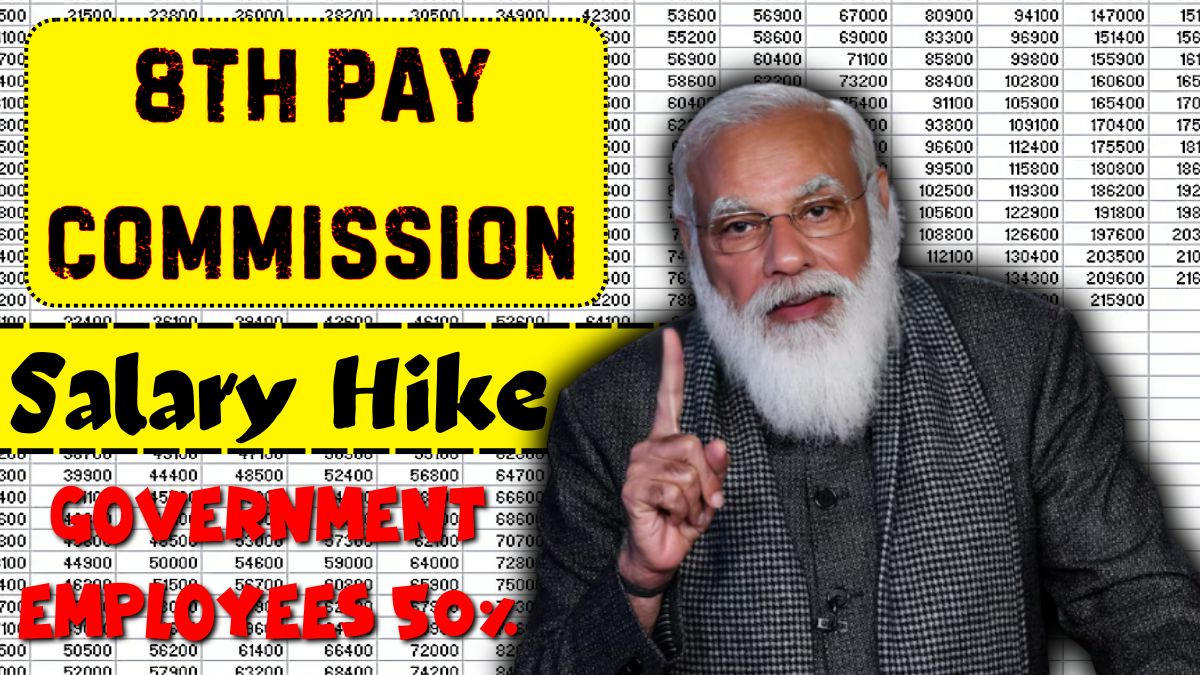8th Pay Commission: The announcement of the creation of the 8th Pay Commission has generated much hope and excitement among central government employees and pensioners. The commission set-up has been confirmed by Union Minister Ashwini Vaishnav; now all eyes are trained on what the potential changes in salaries, pensions, and allowances could be. The biggest question in everybody’s mind is: Will a 50% raise be given? Let’s break down the latest updates, expectations, and timelines.
8th Pay Commission: What is the Latest Update?
In January, central government officials confirmed the formation of the 8th Pay Commission, a move approved by Prime Minister Narendra Modi. Nevertheless, while it was announced before the Union Budget 2025-26, financial details and ramifications on the exchequer continue to remain elusive. The commission will be said to have its full functions going by the year 2026, which is the culmination of the 7th Pay Commission.
Therefore, this period allows the government enough time to consider the recommendations and to bring about the required changes. With more than 49 lakh central government employees and 65 lakh pensioners waiting for clarity, the urgency for determining the new Pay Commission is very high. The 7th Pay Commission is to conclude in 2026, paving the way forward for a new Pay structure.
Read Also: 8th Pay Commission minimum basic salary to be increased to ₹37,440! Good news
The 8th Pay Commission: What Salary and Pension Revisions Can Be Expected?
The fitment factor of the 8th Pay Commission is, perhaps, one of the most debated issues. Experts feel that the fitment factor may very well be in the range of 2.28 to 2.86; this has a direct implication for a 40-50% increase in the basic salary of employees. Let us analyze this in detail:
Effect of Fitment Factor: In case the fitment factor for the basic pay and pension structure is set between 2.6 to 2.85, the basic pay for the employees may be raised by 25-30%, while the pension will have a corresponding increase.
Salary Computation: To illustrate, an employee presently earning a basic salary of Rs 20,000 may see his salary swatch up to Rs 46,600–Rs 57,200 in the post-implementation phase.
Minimum Basic Pay: Minimum basic will be set at anything around Rs 40,000, with allowances and bonuses that depend on performance to further bolster take-home pay.
Pensioners are in for a huge benefit. The minimum pension could increase to Rs 18,720, providing much-needed relief amid rising inflation.
Key Highlights of the 8th Pay Commission
- Fitment Factor: A potential increase to 2.86 could result in a 50% salary hike for employees.
- Pension Revisions: Pensioners may see a proportional rise in their monthly payouts.
- Implementation Timeline: The commission is expected to be fully functional by 2026, with revised pay structures likely effective from January 2026.
- Committee Formation: A dedicated committee will assess and finalize recommendations before submitting them to the central government.
How will the 8th Pay Commission help combat inflation?
The 8th Pay Commission is not merely a vehicle for hiked pay but rather a countermeasure to offset inflation. With the cost of living increasing, the proposed adjustments will, thus, provide some relief to government employees and pensioners. The projected 40-50% pay and pension hike is meant to provide some closure to the gap concerning income versus expense, ensuring at least a decent level of living.
What’s Next for Government Employees?
8th Pay Commission formation has been confirmed, but the process for finalizing recommendations is still on. All the government employees and pensioners are anxiously waiting for the report of the committee that will give the details of the revised pay structure.
The key steps ahead include:
- Setting up the review committee before the end of this month.
- Recommendations will then be submitted to the Central Government.
- Ultimate implementation by 2026.
Final Thoughts
Significant financial gains are feared for the central government employees and pensioners in the 8th Pay Commission. Certainly, a salary increase of around 50% represents potential hikes, while pensions are to be re-established. Hence, the mechanisms of the commission address economic problems and the welfare of the employees. Thus, as the process runs its course, the government will remain in focus as far as the relevant updates and clarifications are concerned.
Keep in touch for updates related to the 8th Pay Commission and its impact on salaries, pensions, and allowances.
